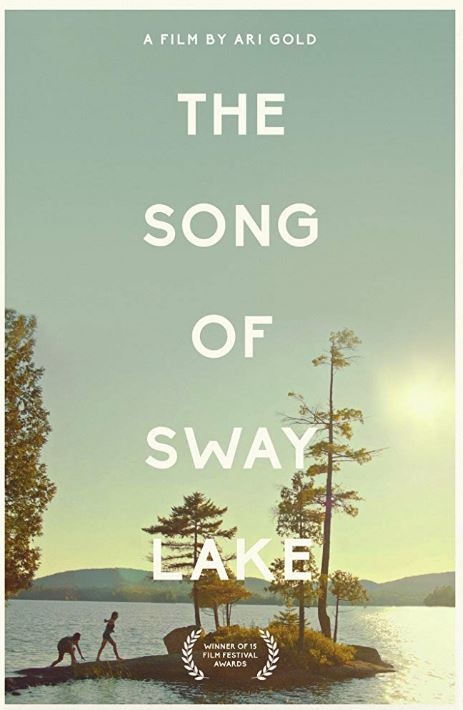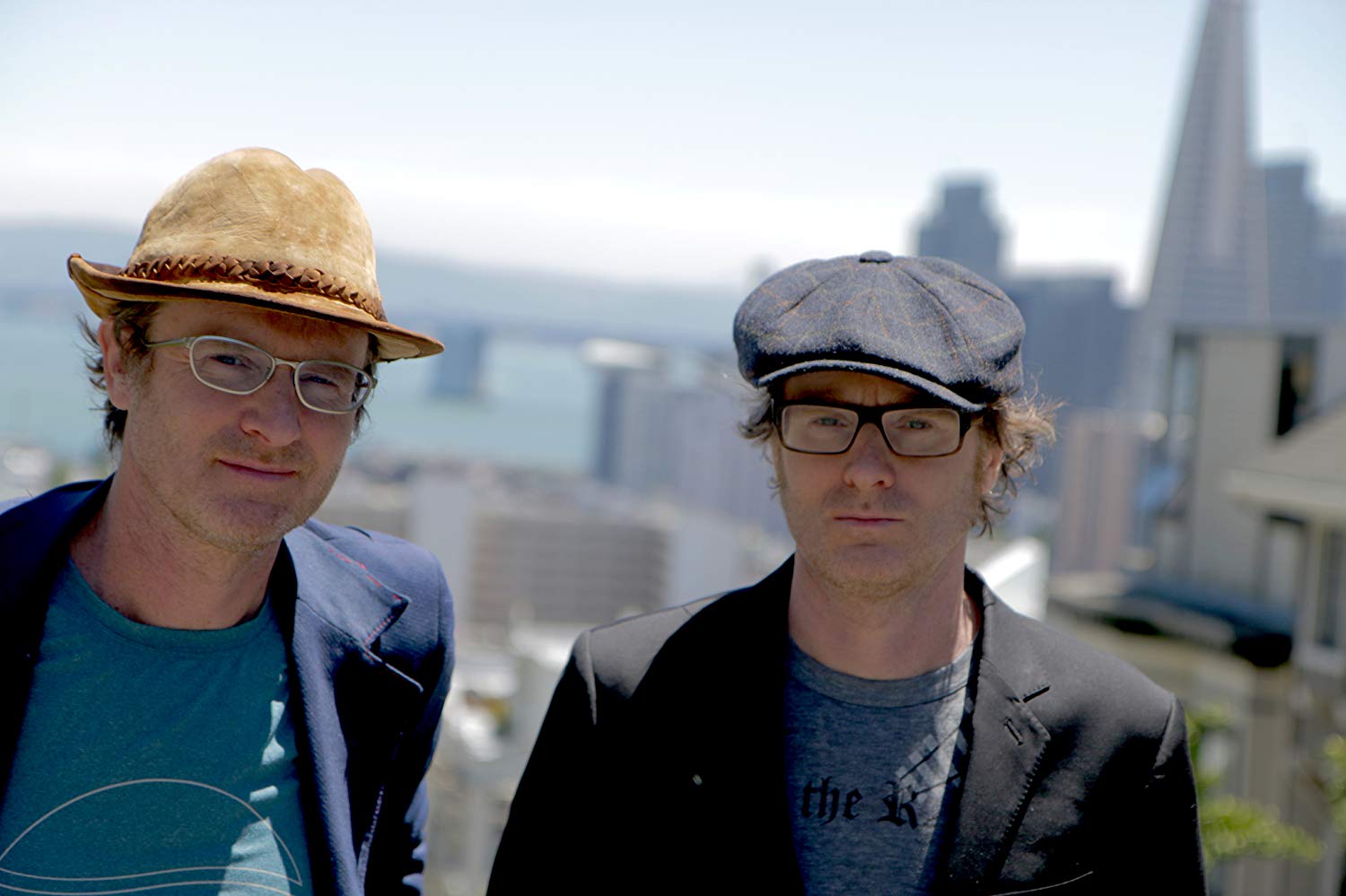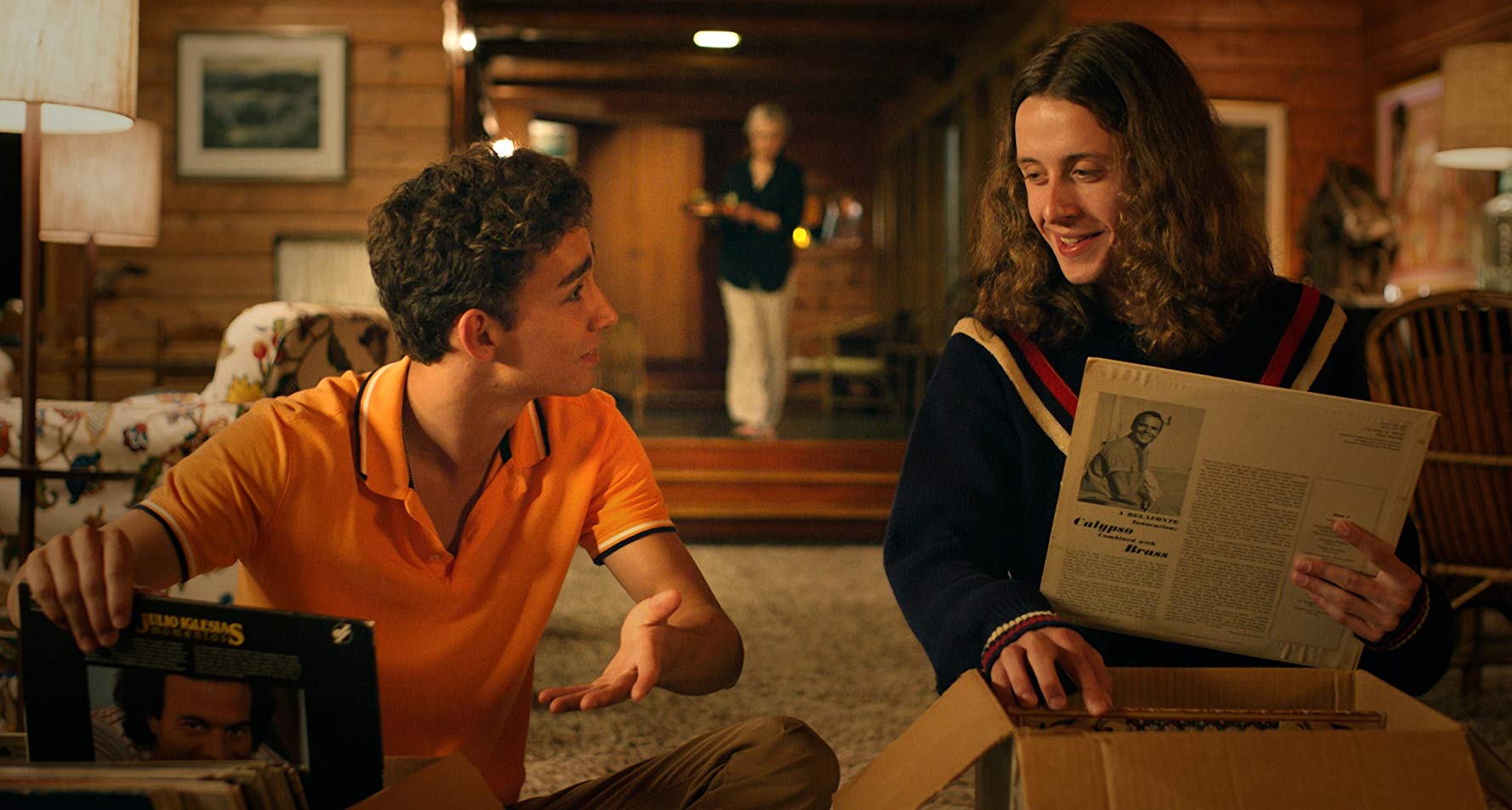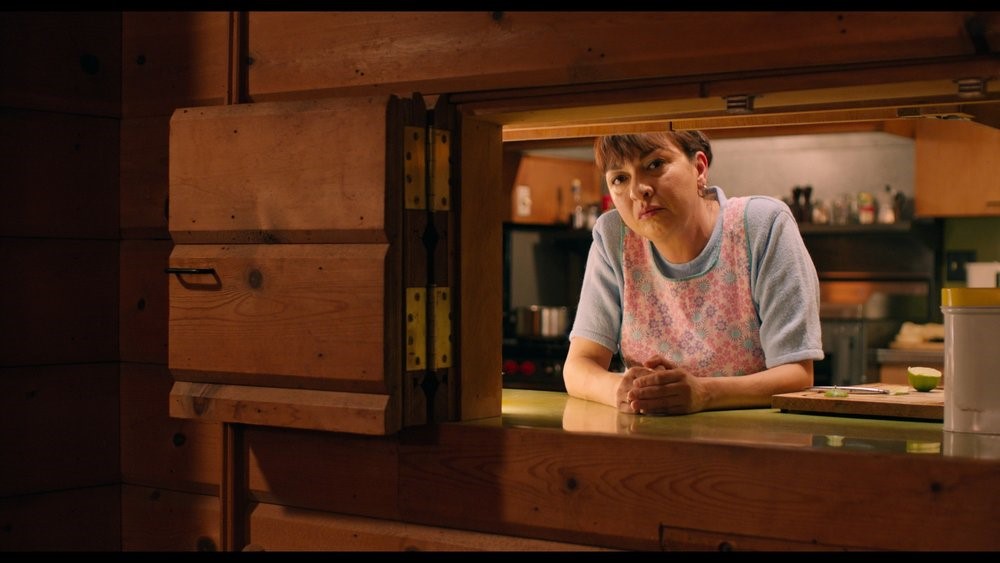
I had the privilege of speaking with Ari and Ethan Gold recently about their film, THE SONG OF SWAY LAKE (my review can be read HERE) and enjoyed discovering more behind how the film came together and hearing more about Elizabeth Pena who passed away after filming was complete. We also discuss just how and why Nikolai, played by Robert Sheehan, came up with his particular walk in the film. To be honest, that was the main goal for me because it’s a hell of character choice, so consider that mission accomplished. Here’s the talk:
_____________________

Dr. Grant: - Ari, what was the inspiration for making this film?
Ari Gold: Well, we grew up going to the Adirondacks, which is a very special part of the country and has a kind of graceful magic from the past that feels like something you can't reach and the sweet allure of wanting to see this glamorous time when the post-World War II Americans had these gorgeous estates up in the lake, north of New York, kinda planted a seed of longing for the past in me that the movie ends up being about. It's about people who have trouble connecting with the present and you have Rory Culkin plays a young man who is... His father's committed suicide and he's trying to erase the past. His best friend is a Russian who wants to kind of absorb someone else's past because he's idealized America growing up and then, the grandmother, played by Mary Beth Peil, who wants to go back to her own past. That meaning didn't actually surface for me until deep in the edit and meditation, with actually a lot of probing questions from Ethan about the meaning of the film.
I have to say that as I wrote it with my co-writer, Liz Bull, I didn't consciously know that's what it was about. I thought it was about love and sex and friendship and old-time music from the forties, which it is, but the deeper meaning is really about getting in sway with life so that you can live, and that's something that I grapple with every day because I get stuck in the past and the future and I forget to breathe. So I hope the film helps people breathe and I’ve seen on the festival tour, when people get a chance to see it on the big screen, get wonderful kind of sensual experience out of it and feel transported and that's something that I think is useful in a world that encourages people, I think, not to feel, and attempt to feel.

Dr. Grant: I watched the film and I really enjoyed it. Ethan, what was your process in writing the music
for this film, both the score and the specific recordings that we used?
Ethan Gold: Well I came into the process after, which is normal, after it was shot. Some people have wondered where the song came from, at the shoot, all of that stuff happened well into the editing process when I came on board. Generally, what I'll do is write a whole bunch of themes that feel appropriate for the setting and for the arc of the characters and feels like it'll kind of have a resonance with the footage and I presented several dozen themes, kind of very simply presented piano demos and so forth to Ari and to the editor at that point. They were initially the songs that ended up being original songs that I composed for the film, were slated to be Cole Porter songs and I guess the first thing that happened was they, Ari and his editor, gravitated towards a couple of the pieces that I'd sent to them and in fact sort of ended up laying them into the film in some of those early piano demo forms and eventually, as we were discussing how the song was gonna fit in, I presented the idea of making an original song. I just thought it would be a wonderful asset to the film to have something totally unique. Unique to the film just as far as the presentation of this unique experience of watching a movie, but also in terms of the resonance that I could build by interweaving elements of the song and the score together so little, kind of micro pieces of the melody would show up in the score and they ended up influencing each other. So, I then wrote maybe eight or ten songs to present to them as well.
So I had a whole bunch of thematic material and a whole bunch of songs and they played with some of those further, and again ended up gravitating towards a few of the pieces, but one of them was one of the ones they were already leaning strongly towards for score material so at that point it kind of became clear what was the stuff that was working for them and then that was developed further, both in terms of the score, which ended up in a lot of cases getting simpler than my presentations. It worked in the score to have a lot of solo piano with some atmospherics just because it fit the kind of more meditative quality that the film was gravitating towards as well as resonating with the fact that the absent, dearly departed patriarch of the family was a piano-playing war hero and so the kind of suggestion of these kind of ghostly figures in the house coming through piano playing made a lot of sense. So the score kind of developed in that direction and the songs developed based on some of those themes and then we developed further and I brought in an arranger, Gina Leishman, to help us flesh out a couple different versions of the song. I'd made demos in a bunch of different feels and then we talked further about what particular era we were going for. In a couple versions of the songs that showed up, one was sort of very late thirties or early forties and one was more post-war. It was a long process, a lot of different ideas getting batted, both in terms of core materials and then in terms of getting the arrangement right. That was more of a kind of targeted, specific effort.
Once I had written a bunch of songs and then we'd gathered around a much more limited amount of material, then we kind of focused on the arrangement and I produced them to sound as much as possible like those eras while not sounding maybe as low-fi, like we went for kind of a split between sounding genuinely late thirties and genuinely late forties but also a little bit more of a rich sonic palate so that it would resonate better on screen and not just telegraphing its oldness. So that was an interesting kind of long discussion about how to evoke an old era while still giving people a kind of physical experience in the theaters when they heard those invented old pieces.

Dr. Grant: Yeah, it's really fascinating, hearing the decisions made and some of it being, you know in this case, post-filming. Watching it, I really got this sense of a dark undercurrent, juxtaposed to that picturesque location and a lot of that, I think, had to do with the music creating some of those undertones. Ari, how did you find this balance between the tone you were going for or the tone in the editing room after you'd kind of done more of this discovery?
Ari Gold: Yeah well, I love your website because I use it all the time. These kinds of discussions are...it's interesting because I think there is this idea in the non-filmmaking public that ideas kind of spring fully formed into the minds of geniuses and everyone who reads your site knows that it's all process. Ethan was hugely influential to the process. There was a lot of back and forth. I think, when we first cut the film, there was a lot of up tempo and as the emotions of the film became more and more important to me, I realized that the tone was set by Ethan's music and the way that Ethan's music played against the songs from the 1920s, '30s, and '40s that are in the film, the interplay between his piano score and his songs that are meant to sound like they come from that era, every background and cue, every time Rory Culkin puts on the 78 record, it had to support this growing emotion, this growing sense of death that happened through the movie, that happened for me in the editing room.
So yeah, it was a very kind of, deep, organic process and actually one of, the first images of the film of the watch sinking into the lake, is something that I shot the day after, after having the vision of that in a meditation where I was grappling with the film and had stopped thinking about it and suddenly saw a watch sinking in water and I realized that that was what the movie was about. That feeling of time and water and coolness, letting something go, came to me as an intro verse, you know when the film was basically almost done and that's what kind of sealed the theme for me that Ethan had really pushed me towards.
Dr. Grant: Yeah, I really liked the watch as far as foreshadowing. Ari can you speak more about the rest of the cast because it's a pretty good cast in here and I thought they all did a job.
Ari Gold: Thank you. Yeah, the two central guys in it are kind of like an odd couple where you have Rory as the depressed guy who's lost his father and has the weight of several generations of a family on his shoulders. Rory comes from a very different kind of family but he also has a big family and then you have this guy without a past, this Russian vagabond who is played by Robert Sheehan, who, though he's Irish, he was the only actor who was brought in for casting who had the spirit of the Russians that I know. There's one Russian friend in particular who really influenced this character and Robert Sheehan understood the comedy of it, and the pathos of it. He really was able to make us laugh, which this Russian friend of mine, a real guy does, and he coached Robert a little bit through Skype when we were working.
Then we had Mary Beth Peil who was nominated for a Tony last year, is on Broadway in her seventies belting out numbers to the back of the theater. She's an amazing, amazing person to work with. I think a lot of people recognize her from Dawson's Creek, The Good Wife, her TV work but she's really a great stage actress who was trained in opera and though she doesn't sing in the movie, I really loved the idea of a natural beauty in her seventies who had that kind of theatrical, operatic quality to her. Because it's a music film, because of Ethan's music, even though she doesn't sing the Sway Lake song, we had the kind of sense in her bones that she was a musical person who had become frozen by her own ego and by death and so she's really, in many ways, the heart of the film for me. Then yeah, Elizabeth Pena who is, very sadly, no longer with us. She was an amazing performer because she was the only actor I can ever imagine working with who asked me for less lines. She said, "I can do more if you give me less lines and I'll just do it with my face." We came up with a whole backstory for Marlena, her character from Cuba who's a servant, almost a slave of the Mary Beth Peil character and we had a lot of secrets about their past and what had happened between them and family and the idea that maybe she had had a little thing with the Sway patriarch when she first came from Cuba and all this was kept from everyone else on the set and whenever I would try to put a line in to kind of support that story she would say, "No, I actually, just let people know it but not know it”, so she was amazing and it's a real loss that she's no longer with us.
Dr. Grant: That scene where everyone was sitting around the table and you could see that look from Elizabeth Pena to Mrs. Sway. It was great, 'cause you really could see her convey those hidden secrets. You could definitely tell that something was up.

Ari Gold: Yeah, I mean it's amazing what she can do with her face, and it's in the eyes, behind the eyes. It seems like she's doing nothing and yet her character comes through so, so strongly. Isabelle McNally was perfect as the purple-haired girl, she's magical and bewildering as is the girl who seems like the perfect girl to Rory Culkin's character and has her own story that she's made up about herself. I was really fortunate, also in the voice cast, not just John Grant and the States who sang Ethan's song, but Brian Dennehy came in and did the voice of the patriarch. We recorded in my bedroom in the East Village on a microphone and we talked for hours about his stories about going to jazz clubs on the Upper West Side, and then we decided to channel a kind of Henry Fonda-style patriarch, which he did with such panache. You know, for those film school people out there, it's amazing to think that you can have a great actor like that sitting in your room with a microphone and work with you because you’ve given him something fun to do. So that can happen and we're so blessed to have him in the movie as well.
Dr. Grant: What about Robert Sheehan's walk? Where did that come from?
Ari Gold: A lot of people ask about the walk. One trick that is something that I can't remember if I read this somewhere but if you give an actor a certain pair of shoes, it changes their whole performance. So we gave Robert really heavy boots and so he started doing this strange, like, injured antelope walk. I don't know quite how to describe it but he walks like he's prowling for prey, like he isn't actually a predator. He wants to be a predator. Yeah, it started with the shoes but he does it even when he's barefoot in the movie, too. It's like his calves are wound up and he can't walk normally. It does so much for the character, you know 'cause it seems like he walked out of outer space and the walk has a lot to do with that. I'm glad you noticed that.
Dr. Grant: Yeah, for a second I almost thought he was more channeling Igor, he was like a slave to Mrs. Sway or the lake itself. He had this kind of haunted-
Ari Gold: -He becomes that in the course of the movie.
Dr. Grant: Right!
Ari Gold: He progresses to that, for sure.
Dr. Grant: I Definitely appreciate you guys taking the time to talk with me today. Just wanted to quickly ask what projects you’re currently working on?
Ari Gold: Yeah, I have a TV show that I am going to start pitching soon which is very different from this. It's an action-adventure with environmental themes.
Ethan Gold: Well, I'm excited to be releasing the album for the film, which will be coming out September 21st and then in Europe in early November and I have another Ethan Gold record coming out, I actually released an instrumentals record just six weeks ago and I've been putting out a lot of music so people can use the interwebs to see what I've been doing and will be doing. So yeah, I have a bunch of music coming down the pipe as well, so.
Dr. Grant: Awesome, thanks again so much, I really appreciate it.
Ari Gold: Well thank you. I really appreciate what you guys do. It helps me a lot in the middle of the night, sometimes when I'm confused I'll poke around and look for inspiration and how other people are solving problems, so thank you.
Dr. Grant: Thanks a lot guys!
Ethan Gold: Thank you.
Ari Gold: Thanks!
_____________________
I enjoyed the chat with those gentlemen. Ethan’s music website can be found at https://ethangold.com/. Again, check out my review of the film HERE. It’s out now on VOD so go check out Robert Sheehan awkwardly strutting around in his birthday suit.
- Dr. Grant

